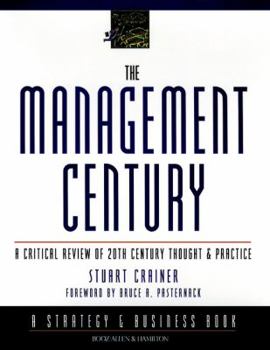The Management Century: A Critical Review of 20th Century Thought and Practice
Select Format
Select Condition 
Book Overview
It's been with us since the dawn of civilization. But only in the past one hundred years has management been recognized, and formalized, as a profession. Now, in The Management Century, business journalist Stuart Crainer offers a fascinating, lively tour of management's golden age in a book filled with historic characters any novelist would envy. From Henry Ford to W. Edwards Deming, the innovators Crainer visits here are as in-triguing as the ideas...
Format:Hardcover
Language:English
ISBN:0787952249
ISBN13:9780787952242
Release Date:February 2000
Publisher:Jossey-Bass
Length:304 Pages
Weight:1.65 lbs.
Dimensions:0.9" x 7.3" x 9.5"
Customer Reviews
3 ratings
Well Written Review of Managment Thought
Published by Thriftbooks.com User , 20 years ago
Stuart Crainer has written a very good review of management thought for the 20th Century. This is the perfect book for those who want a refresher from their principles of management class in business school or for those who never had one. The opening belongs, as one would expect, to Frederick W. Taylor and surprisingly Elihu Root. From there it is simply the progression of managment thought over the course of the twentieth century. Going by decade Crainer offers up the trend of managment theory and practice with insights from the important thinkers and practitioners of the times. At the end of each chapter there is a brief timeline as well as a sample of the companies on the Dow at that time and various bits of information that provide the opportunity for further study. All in all this is a wonderful book!!
Must read for anyone in business
Published by Thriftbooks.com User , 23 years ago
If you're in business, you have an obligation to understand the people and trends before you to give you an understanding of the framework in which you currently work. Starting in 1900, Crainer talks about the impacts of Frederick Winslow Taylor's work in scientific management and its impact on such industrial giants as Ford and General Motors. Proceeding along, you'll learn why the work of Mary Follett (one of the first female management gurus) was so important to the rest of the decades and which gurus she has influenced since then. Max and Weber, they are in here, and Ray Kroc is too! The best part about this book is that it will give you a timeline, so you can quickly understand the century at a glance and understand which trends happened when and how they created a new future for managers and employees alike. From this book, you'll also get a list of the top 5 Harvard Business Review articles for each decade, starting from the 1950s on.
Ten Decades of Thought Leadership
Published by Thriftbooks.com User , 24 years ago
This is one in a series of "Strategy & Business" books from Booz-Allen & Hamilton, published by Jossey-Bass. All are first-rate and well-worth checking out. In this book, Crainer devotes a separate chapter to each of the 20th century's ten decades, concluding each chapter with a timeline. In the final chapter, he provides an insightful analysis of "The State of Management."In his Preface, Crainer observes that "the historical and theoretical strands that go to make up management are many and varied. The great management thinkers are drawn from a bewildering variety of disciplines and professions." He then explains that his book "aims to gather together many of these gloriously varied strands and provide a concise and insightful guide to the major developments in thinking and practice during the twentieth century." Here in the proverbial "nutshell" is what this book is all about. Given the wealth of rock-solid content contained within a single-volume, presented with a crisp writing style, Crainer's is indeed a brilliant achievement. Here are the ten periods and some of the "great management thinkers and practicioners" discussed in each:1900-1910: Stopwatch Science [eg Elihu Root, Henri Fayol, and Frederick Winslow Taylor]1911-1920: Modern Times [eg Henry Ford, Frank & Lilian Gilbreth]1921-1930: Discovering the Organization [eg Max Weber, Chester Barnard, Billy Durant, and Alfred Pritchard Sloan Jr.]NOTE: Throughout the book, Crainer inserts his comments. For example: "Taylor discovered work. Ford discovered work on a massive scale. Sloan organized work. And no one discovered the people doing the work." That is, until the 1930s.... 1931-1940: Discovering People [eg Mary Parker Follett, Bill Hewlett & David Packard]1941-1950: Lessons in War [eg William S. Knudsen, Walter Shewhart, Akio Morita, Konosuke Matsushita]NOTE: In 1950, Peter Drucker becomes professor of manager at New York University. "The first person anywhere in the world to have such a title and to teach such a subject," he later said.1951-1960: Living the Dream [eg Ralph Cordiner, Thomas Watson, Sr. and Jr., Peter Drucker's The Practice of Management, Theodore Leavitt, Abraham Maslow, Frederick Herzberg, Douglas McGregor]1961-1970: Understanding Strategy [eg Drucker, rediscovery of Sun Tzu and von Clausewitz, Alfred Chandler, Igor Ansoff, Henry Mintzberg, Harold Geneen, Robert Townsend]1971-1980: Organized Paralysis [Alvin Toffler, Thomas J. Peters, Elliott Jaques, Reg Revans, E.F. Schumacher, Meredith Belbin]1981-1990: An Excellent Adventure [Robert Hayes & Bill Abernathy, rediscovery of W. Edwards Deming, William Ouchi, Kenichi Ohmae, Joseph Juran, Michael Porter, Gary Hamel, Rosabeth Moss Kanter, Warren Bennis]1991-2000: The New Balance of Power [eg Michael Hammer, Percy Barnevik, John Francis Welch Jr., Michael Dell,]As indicated previously, in the final chapter Crainer provides his own analysis of "The State of Management." It is ve





